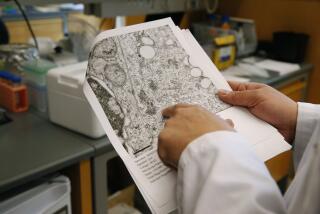Insatiable Appetite Marks Rare, Shocking Illness : Prader-Willi Sufferers Can Eat Themselves to Death, but Help Is Often Hard to Find
- Share via
A 5-year-old boy raids the refrigerator nightly, devouring half a roast, cans of dog food, a quart of mayonnaise and even a four-ounce bottle of penicillin prescribed for a cold.
A 10-year-old eats 12 pumpkin pies left out to cool in a home-economics classroom in his elementary school.
A 19-year-old man reaches 400 pounds before dying of complications resulting from obesity.
Prader-Willi Syndrome is as horrifying as it is rare. Individuals afflicted with the mysterious illness begin to show signs of an insatiable appetite at about 3 years old. They will eat anything and everything they can get their hands on.
“Like a drug addict or an alcoholic, they will do anything for food. They will lie, cheat and steal,” said Cal Menzer, whose 30-year-old son, Mark, has Prader-Willi.
Menzer and other such parents face the virtually impossible task of trying to find help for their children. The syndrome has gone virtually unnoticed because of its rarity; it is estimated that there are only about 2,000 cases in the United States.
“Many doctors haven’t even heard of it,” Menzer said. “Only certain people are aware of the characteristics or syndromes.”
Spreading Word About Disorder
For the last eight years, Menzer, a clothing retailer, has worked out of his Encino home writing letters to government officials, talking to doctors around the country and holding fund-raisers to publicize the disorder. He is the co-founder and leader of the Prader-Willi California Foundation, a group of about 100 families--10 in the San Fernando Valley--that are grappling with the problem.
“The scary part about Prader-Willi is when you’re by yourself and there are no others around with the syndrome,” Menzer said. “If you have people you can talk to and compare notes with, that’s salvation.”
Swiss doctors Andrea Prader, Heinrich Willi and Alexis Labhart first described the birth defect in 1956.
The symptoms appear at birth. Ninety-five percent of Prader-Willi infants are slightly mentally retarded. They almost always suffer from poor muscle tone. A Prader-Willi child is unable to control his head, arms or legs, and has a weak cry, poor sucking ability and poor vision.
By age 2 or 3, the child begins to gain muscle strength. Up to this point, Prader-Willi sufferers are usually small, frail and have little appetite. The appetite picks up, though, and soon becomes a critical problem.
“I was so excited when he was 3 and reached normal weight,” Helen Diebold of Sherman Oaks said of her son, Stephen, who is now 25. “The doctor told me, ‘This is when your troubles begin.’ I never knew.”
Prader-Willi children can eat enormous amounts of food without becoming nauseated or vomiting. Researchers do not know what causes such an appetite, said Dr. Vanja Holm, an associate professor of pediatrics at the University of Washington and a leader in Prader-Willi research. Holm said it is believed that the problem arises from a chemical imbalance in the hypothalamus, a region of the brain associated with appetite control.
“We have not found anything medically that works,” Holm said. “They really are at a risk of dying of complications of obesity.”
The birth defect not only gives Prader-Willi sufferers an incessant desire to eat, but also causes them to gain weight easily. Left to their own, sufferers of the disorder will gain three to five pounds a week, eating garbage, raw meat, anything even slightly edible.
In the past, the life expectancy of such people was short; they would virtually eat themselves to death. Today, more doctors are able to diagnose the syndrome and prescribe a diet, making it possible for Prader-Willi sufferers to have a normal life expectancy, Holm said.
There is another symptom that is less serious but also less easily controlled--temper tantrums. Prader-Willi sufferers will lash out violently at the slightest provocation, then become docile for hours afterward until the next outburst.
“These kids know they are different. Who knows how much hurt they have inside them?” Diebold asked. “They keep it inside, and it comes out as tantrums.”
This element, combined with obesity and retardation, makes it difficult for Prader-Willi sufferers to remain at home. Most are institutionalized. They cannot live alone.
But increasing research has yielded hope. Chromosomal abnormalities recently have been detected in a majority of children afflicted with Prader-Willi. Doctors hope that this discovery will lead them to a better understanding of the symptoms and their causes.
“There are many rare syndromes, this is just one of them,” Holm said. “But many more people know about it now than, say, 10 years ago. We’ve come a long way in the last few years, and I hope we will continue that way.”
Menzer himself did not discover that his son had Prader-Willi until Mark was 5. Before that, doctors had offered a number of diagnoses. The Menzer family, including his wife and three other children, saw a family psychologist with the hope of treating Mark’s mysterious affliction.
Finally a friend showed Menzer a magazine article written about Prader-Willi. It was, for the Menzers, both a relief and an awakening. At that point, Cal Menzer set out to find and organize other Prader-Willi families. Diebold recalled reading a newspaper article about Menzer’s newly formed group in 1978.
“You don’t know what a thrill it was,” she said. “After years of fighting with doctors, people who didn’t know what it was, didn’t understand it. . . .”
William and Antoinette Campoy, of Studio City were also glad to find Menzer after their 8-year-old son, Christian, was diagnosed as suffering from Prader-Willi.
“It was gratifying to understand that we were not alone. We support each other,” Antoinette Campoy said. “It’s not something we wished on ourselves. We just have to learn to live with it.”
The foundation has recently joined forces with the Prader-Willi Syndrome Assn., a nationwide group headquartered in Minnesota. Whereas the larger group has focused on medical research, the California foundation is setting its sights on raising money to open more homes for Prader-Willi sufferers in this state.
According to a survey Menzer conducted, there are 112 Prader-Willi sufferers in California who receive medical aid at state centers. Of those patients, 56 are in need of a group home. Many of those already institutionalized, Menzer said, need to be moved to homes in which the staff is trained to deal specifically with Prader-Willi.
Stephen Diebold was recently asked to leave a home in San Diego because he exhibited what the staff believed to be excessive violence. Helen Diebold said she believed that her son was not properly supervised.
“These kids have to have good homes that are staffed properly,” she said. “They need to be handled and trained.”
“I don’t miss the staff there,” said Stephen, who is relatively articulate and intelligent for a Prader-Willi sufferer. “They go hiring people who don’t have credentials.”
There is one Prader-Willi home in the Valley, run by the Dubnoff Center in North Hollywood. But that home holds only three teen-agers. Menzer said the foundation hopes to raise $100,000 to open another, larger home. The foundation has already garnered about $25,000 in donations and is planning a fund-raising golf tournament on April 25 in Chino. Antoinette Campoy is trying to organize a celebrity benefit show.
Meanwhile, Helen Diebold is searching for a new home for Stephen. Since he has been home, she has had to hire a daytime nurse who comes in for eight hours a day at $10 an hour. The state pays $3.65 an hour of that bill. And Stephen has several times raided the refrigerator at night. He has gained 35 pounds since coming home.
Cal Menzer also has problems with his son. Mark recently ran away from his home in El Monte. Menzer believes that his son needs psychiatric counseling, but the state funding for that part of his therapy ran out several months ago. So Menzer has been on the telephone to Sacramento.
“I’m going to yell and scream until I can get some help. But I’m tough. Other people aren’t as aggressive,” Menzer said. The group, he said “guides them and helps them. We’ll tell them, ‘This is what we did. Try this.’ ”
More to Read
Sign up for Essential California
The most important California stories and recommendations in your inbox every morning.
You may occasionally receive promotional content from the Los Angeles Times.














